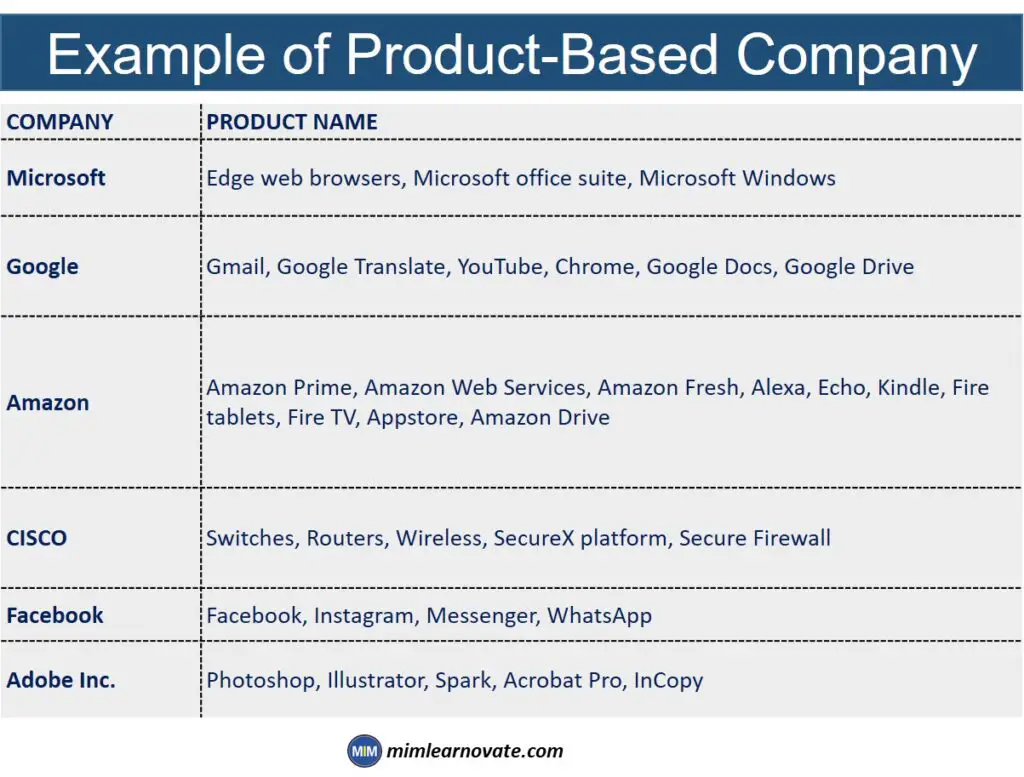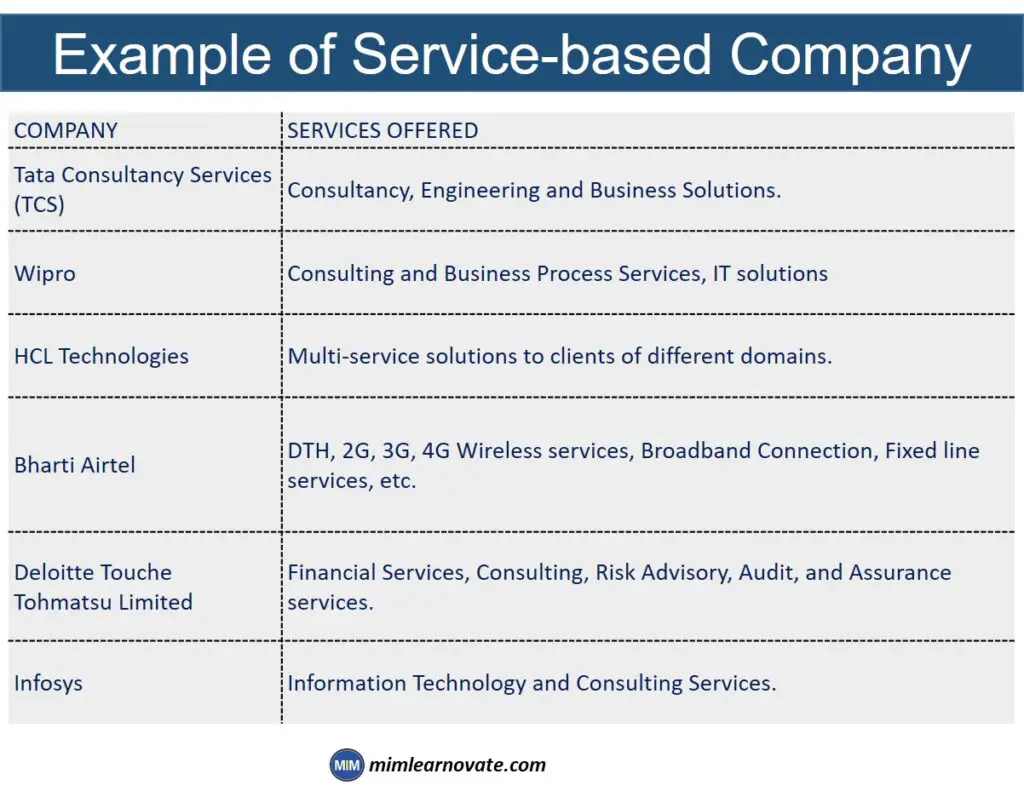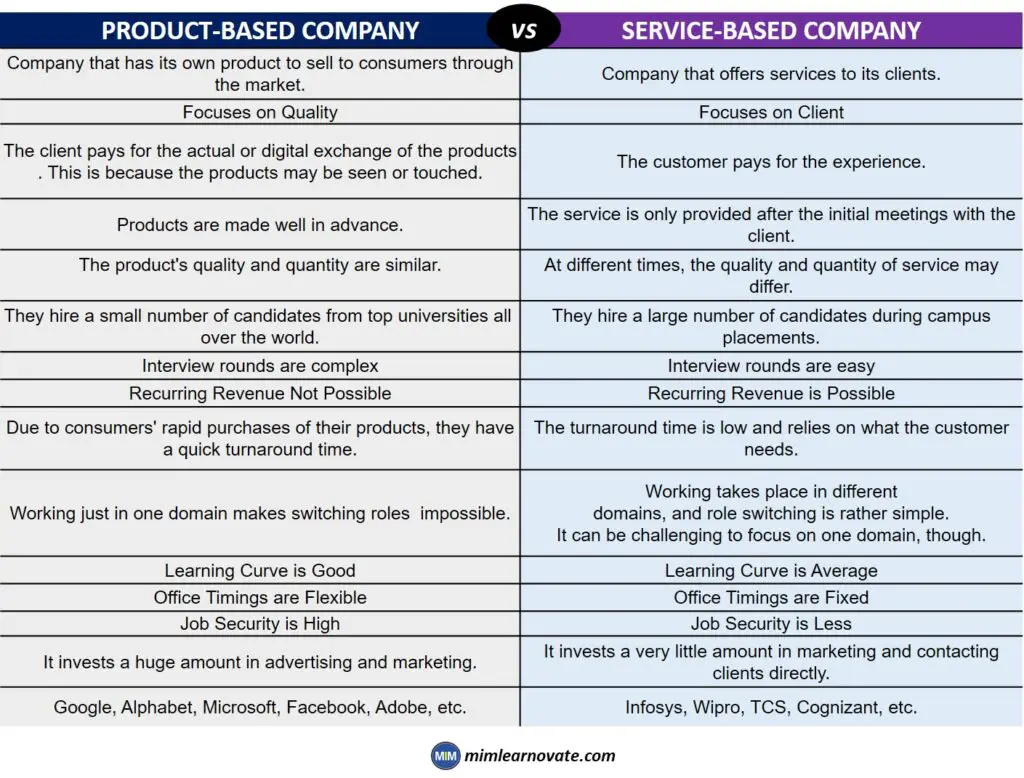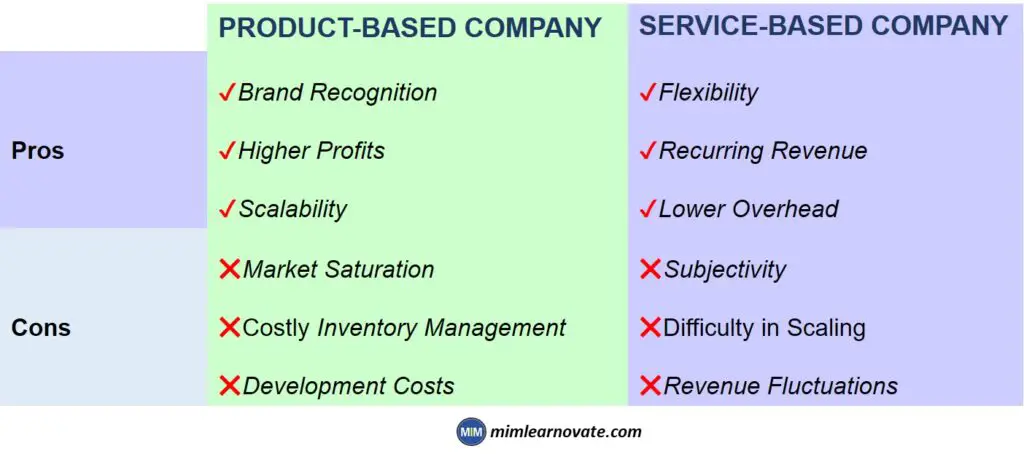Choosing the right organization is essential since your entire career will be determined by the skills you gain and the abilities you possess. Everyone wants to work for a company that encourages skill development and offers a conducive environment for learning.
Before choosing your dream company, nearly every individual must decide whether to choose a service-based company or a product-based company.
You must have come across the terms “Product Based Companies” and “Service Based Companies” when reading the job descriptions while applying.
Have you ever wondered what they are exactly?
In this article you will learn the difference between Service-Based Company and Product-Based Company.
Product-Based Company
A company that focuses on developing and launching its own products is said to be product-based. The majority of the time, the products have a high market value. Additionally, these goods may be able to satisfy customer needs. They strive to produce top-quality products. Additionally, it works to enhance the products by including new features.
These businesses produce high-quality goods that may effectively address major company problems.
When it comes to perks, pay, and other factors that affect employee satisfaction, these businesses offer a better work culture.
Product-based businesses pinpoint the gap between needed items and what is currently on the market. The company then creates a product that offers the clients a solution for their specific need.
They don’t create things for a certain market. This implies that they design products with a specific class or group in mind. They conduct research for this reason and launch a line of goods that satisfy the needs of the vast majority of people. As a result, they sell their items to as many people as possible.
Product-based companies in the IT industry are those that develop technology for their own customers. These businesses are the owners of one or more digital products.
A company that sells clothes, textbooks, or electronic books can be a product-based company.
It is simple to start one of these businesses. Additionally, it is simple to set your product apart from that of competitors, especially if you are the only company selling it.
Example of Product-Based Company
| COMPANY | PRODUCT NAME |
|---|---|
| Microsoft | Edge web browsers, Microsoft office suite, Microsoft Windows |
| Gmail, Google Translate, YouTube, Chrome, Google Docs, Google Drive | |
| Amazon | Amazon Prime, Amazon Web Services, Amazon Fresh, Alexa, Echo, Kindle, Fire tablets, Fire TV, Appstore, Amazon Drive |
| CISCO | Switches, Routers, Wireless, SecureX platform, Secure Firewall |
| Facebook, Instagram, Messenger, WhatsApp | |
| Adobe Inc. | Photoshop, Illustrator, Spark, Acrobat Pro, InCopy |

Service-based Company
Service-based companies are those that provide clients and customers with solutions. Depending on the needs of the clients, there are amenities, skills, and expertise.
These firms provide services to other organizations. They essentially sell the time of their employees to their clients because they don’t have a product of their own.
For example:
- A service-based company would include a web hosting company.
- A company that provides a marketplace for you to locate the best buyers for your used product.
A service-based company only provides exclusive services. This suggests that the services are customized to meet the demands and requirements of the customers. Additionally, the services are not shared to other clients.
A service-based company in the IT sector offers software house services like engineering, design, and other services.
These businesses search for a combination of hard and soft skills when hiring new employees.
In the market, these companies compete aggressively. They must be unique in order to maintain their quality and reputation in the market.
Example of Service-based Company
| COMPANY | SERVICES OFFERED |
|---|---|
| Tata Consultancy Services (TCS) | Consultancy, Engineering and Business Solutions. |
| Wipro | Consulting and Business Process Services, IT solutions |
| HCL Technologies | Multi-service solutions to clients of different domains. |
| Bharti Airtel | DTH, 2G, 3G, 4G Wireless services, Broadband Connection, Fixed line services, etc. |
| Deloitte Touche Tohmatsu Limited | Financial Services, Consulting, Risk Advisory, Audit, and Assurance services. |
| Infosys | Information Technology and Consulting Services. |

Difference between Service-Based Company and Product-Based Company
- A product-based company is one whose primary revenue derives from the sale of products. However, a service-based company is one that does not produce its own products but rather provides services to other companies or clients.
- When it comes to the scalability of the product in product-based company that sells its own products, quality is considered as king. In contrast, in service-based company customers are seen as king. The reason for this is that these businesses want their clients to be satisfied with the services since only then will they be retained for the long term.
- Product exchanges might take place physically or digitally in the case of product-based companies. Unlike service-based companies, where customers pay for the experience.
- The product’s quality and quantity are same in product-based companies. In contrast, the quality and quantity of service change depending on the client in service-based company.
- Only a small number of candidates from the best universities worldwide are hired by product-based companies. In contrast, service-based companies frequently hire a large number of applicants from different universities during campus placements.
- Product-based companies have a favorable learning curve. However, the learning curve for service-based companies, is average.
- Product-based companies offers flexible working hours to its employees. On the other hand, service-based companies have fixed work hours.
- When it comes to job security, a product-based company has a greater level than a service-based company.
- Product-based companies spend a lot of money promoting and marketing the products that they sell. However, service-based companies spend very little money on marketing and directly contacting clients.
- Product-based companies cannot generate recurring revenue. This is due to the company’s need to develop new products in order to attract more customers and generate income for your company. On the other hand, service-based companies profit from the potential of recurring revenue. This is due to the fact that the client continues to pay a regular cost for their services. Additionally, recurring revenue is advantageous since it credits a certain amount to the business account of the company each month or year. This sum multiplies as the company’s customer base expands. In this way, it contributes to the company’s long-term earnings.
Service-Based Company Vs. Product-Based Company
| PRODUCT-BASED COMPANY | SERVICE-BASED COMPANY |
|---|---|
| Company that has its own product to sell to consumers through the market. | Company that offers services to its clients. |
| Focuses on Quality | Focuses on Client |
| The client pays for the actual or digital exchange of the products. This is because the products may be seen or touched. | The customer pays for the experience. |
| Products are made well in advance. | The service is only provided after the initial meetings with the client. |
| The product’s quality and quantity are similar. | At different times, the quality and quantity of service may differ. |
| They hire a small number of candidates from top universities all over the world. | They hire a large number of candidates during campus placements. |
| Interview rounds are complex | Interview rounds are easy |
| Recurring Revenue Not Possible | Recurring Revenue is Possible |
| Due to consumers’ rapid purchases of their products, they have a quick turnaround time. | The turnaround time is low and relies on what the customer needs. |
| Working just in one domain makes switching roles impossible. | Working takes place in different domains, and role switching is rather simple. It can be challenging to focus on one domain, though. |
| Learning Curve is Good | Learning Curve is Average |
| Office Timings are Flexible | Office Timings are Fixed |
| Job Security is High | Job Security is Less |
| It invests a huge amount in advertising and marketing. | It invests a very little amount in marketing and contacting clients directly. |
| Examples are Google, Alphabet, Microsoft, Facebook, Adobe, etc. | Examples are Infosys, Wipro, TCS, Cognizant, etc. |

Benefits and Drawbacks of Product and Service-Based Companies
Benefits of Product-based companies
Product-based companies have a number of benefits over service-based ones, including:
Brand Recognition: Products can be advertised and branded, which increases brand loyalty and consumer recognition.
Higher Profits: Compared to services, products can be offered at a higher profit margin.
Scalability: Production is comparatively simpler and doesn’t necessarily need more staff members, offices, etc.
Disadvantages of Product-based Companies
Additionally, there are a number of drawbacks for product-based companies:
Market Saturation: When a market for a particular product is saturated, it can be challenging to stand out from the competition.
Inventory Management: Keeping track of inventories and storing them can be expensive.
Development Costs: Creating a new product can be costly and time-consuming.
Advantages of Service-based Companies
Additionally, service-based companies offer the following benefits over product-based companies:
Flexibility: Services can be customized to each customer’s specific requirements.
Recurring Revenue: Service contracts can result in recurring revenue and long-term client relationships.
Lower Overhead: those that provide services often have lower overhead expenses than those that produce products.
Disadvantages of Service-based Companies
Additionally, there are a number of drawbacks for service-based companies:
Subjectivity: A service’s quality is frequently subjective and might differ from one customer to another.
Difficulty in Scaling: Scaling services can be tough because it frequently requires more employees and resources.
Revenue Fluctuations: Depending on the amount of projects or contracts they are working on at any given moment, service-based companies may have revenue fluctuations.
| PRODUCT-BASED COMPANY | SERVICE-BASED COMPANY | |
| Pros | ✔Brand Recognition ✔Higher Profits ✔Scalability | ✔Flexibility ✔Recurring Revenue ✔Lower Overhead |
| Cons | ❌Market Saturation ❌Costly Inventory Management ❌Development Costs | ❌Subjectivity ❌Difficulty in Scaling ❌Revenue Fluctuations |

Conclusion
Everyone wants to flourish in their career and progress. Tech industry employees are frequently faced with the decision of whether to join a product- or service-based company. Both have benefits and drawbacks. Depending on what they want out of a profession, they may choose any one of them.
Other articles
Please read through some of our other articles with examples and explanations if you’d like to learn more about marketing.
Management
- Human Resource Management
- Management Information System
- Why is Information Governance Important?
- How Data Analysis Is Changing Information Governance?
- The St. Gallen Management Model
- System-Oriented Management
- Tools Transforming Knowledge Management
- Levels of Management
- Information Management Software
- Tools for Information Management
- Information Governance vs Records Management
- Management Information System Books
- Greenwashing: A Case Study on DWS
- Greenwashing Examples
Statistics
Marketing
- Strategic marketing planning
- Marketing Environment
- Consumer buying decision process
- Factors Influencing Consumer Behavior
- Product Positioning
- Target Market Strategies
- Market Segmentation
- STP Process
- Data Analysis Process
- Consumer Adoption Process
- Branding
- Product Life Cycle
- Product Attributes
- Price Discrimination
- Service-Based
- Company Vs. Product-Based Company
- Product Classification
- Penetration Pricing and Price Skimming
- Case Study of Nestle
- Fast-Moving Consumer Goods
- Motorola’s Customer-Defined, ‘Six-Sigma Quality
- PEST And a SWOT Analysis
- Web Design Company Vs. a Web Designer
- Internal and External SWOT Analysis
- Strategic Opportunism
Marketing Analysis
ChatGPT
- ChatGPT For Keyword Research
- Prompts for New Business Idea Generation
- ChatGPT Business Entrepreneur
- Learn Languages with ChatGPT
- Use ChatGPT on WhatsApp
- ChatGPT as Virtual Research Assistant
- ChatGPT for Meta-Analysis in Research
- ChatGPT For Large Documents
- ChatGPT for Hypothesis Development
- ChatGPT for Text Analysis
- ChatGPT to Write Code in Python
- ChatGPT to Write Literature Review
- Books ChatGPT


